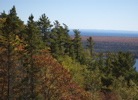news: final report released December 12, 2007
We are pleased to release our final report! An electronic version may be downloaded here: UP_Corporate_Forest_Land_Report.pdf.
welcome
Over 1 million acres of corporate timberland in Michigan's Upper Peninsula changed hands in 2005-06. Ownership change is a primary vector for land use change. New owners will open some of these lands to new types of development that will help shape the future economic, social, and natural landscapes of the region. In this research, an analysis of corporate timberland ownership patterns and related change in management practices will be made and be used to yield policy and market-based strategies to preserve local prosperity, wildlife, and public access.
The UP in transition

The Upper Peninsula is undergoing a dramatic transformation in land ownership and economic makeup. Two recent large scale land sales underscore this change. In 2005, Plum Creek Timber Company, Inc., a real estate investment trust (REIT), purchased 650,000 acres in the UP from Escanaba Timber LLC, formerly Mead Paper, MeadWestvaco, and then NewPage Corporation. The purchase made Plum Creek, headquartered in Seattle, WA, the largest private landowner in Michigan. The second major land sale was in 2006 when International Paper (IP) sold 440,000 acres in the UP to the consortium of GMO Renewable Resources.
Other recent notable sales activities include the purchase of 6,275 acres of land by The Nature Conservancy on the Keweenaw Peninsula, The Forestland Group, LLC purchase of 390,000 acres from the Kamehameha Schools Trust of Hawaii, and We Energies' announcement of the potential sale of 11,000 acres in the Western UP. The Forestland Group purchase led to the Northern Great Lakes Project, in which The Nature Conservancy and the State of Michigan entered into an agreement with them to protect more than 271,000 acres.
While the long-term implications of such dramatic and large-scale changes remain unclear, they have prompted concern about the future of the UP's economic base and its traditionally resource-based, rural communities. Specific questions have arisen regarding the potential for decreased economic viability of forestry as an economic force in the UP, increased fragmentation of the landscape, and reduced public access to forest lands (Traverse City Record Eagle, 2005). The convergence of many factors, from global to local, is driving these land sales. Advances in technology, communications and transportation infrastructure have made the UP less "remote". Land use trends, population changes and demographics also play important roles. Additionally, the region is increasingly impacted by powerful dynamics in the national and global economy, as resource supply and demand respond to the increasingly "flat" world marketplace.